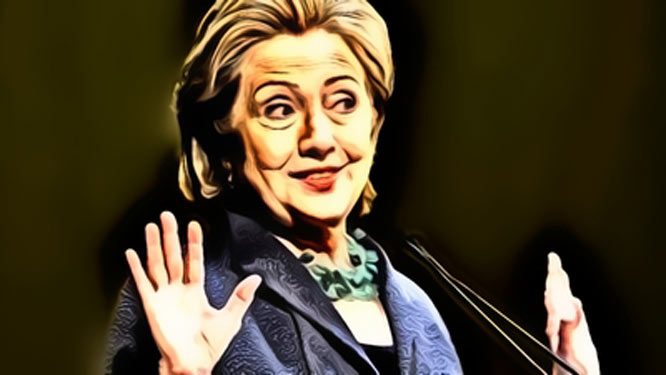
The Democrats can run, to paraphrase Muhammed Ali's rebuke of a timid opponent, but they can't hide. Hillary Clinton is turning her campaign into a game of hide-and-seek, and the party is terrified. Some leading Democrats are beginning to say out loud what they have said privately for weeks.
What she thought would be a cake walk to Philadelphia and the 2016 nomination is beginning to look like a cornbread walk, and cornbread has no icing.
She took a spanking on the Sunday talk show, with her party critics focusing on her reluctance to speak up on several key issues, including one or two that have been close to the beating heart of her party.
The rebukes are still softly stated, but there's power in understatement. Sen. Diane Feinstein of California says it would be "very helpful" if she took a stand on the trans-Pacific trade agreement, which President Obama is trying hard to push through Congress. If he makes it the credit will go to free-trade Republicans. Democrats beholden to the labor unions — which is most of them — threaten to deprive the president of a majority of his own Democrats.
Sen. Bernie Sanders of Vermont, who seems to be everybody's favorite Socialist, says Hillary should "absolutely" take a position (against) in the debate. And not just in Congress. Some of Hillary's friends in the punditry are telling her the same thing.
David Ignatius, whose column appears on JWR, says her silence on the trade debate in the Congress is "deeply troubling," which is softspeak for "bad."
Jonathan Martin of The New York Times says her silence is "deafening," and Robert Gates, the former secretary of defense and before that director of the CIA, says the silence is "a concern" and "a risky way to do business." Those rebukes are about as soft as a rebuke can get, but they're on the record with remarks that would have required smelling salts to revive them from such manly exertions only a month ago.
Some of Hillary's friends are saying — out loud — that she's making the same mistakes she made in 2008. Her sole strength has been the illusion that she was unstoppable, and it's on this illusion that her campaign is based — just as it was four years ago. Illusions are the stuff of dreams, not hard reality. Better to avoid taking a stand on substance; the election is more than a year and a half away, plenty of time to change unfashionable convictions, to trade in principles for the newer model.
She has time, in this calculation, to test new convictions and principles against what she finds in polling, focus groups and her gut instincts. "Her approach to this really is not trying to take a ruler out and measure where she wants to be on some ideological scale," John Modesta, her campaign chairman, tells The Washington Post. "It's to dive deeply into problems facing the American people and American families. She's a proud wonk, and she looks at policy from that perspective."
And who knows how to dive deeply into the shallows, trolling for the latest conviction, more skillfully than a Clinton?
Critics on the left, prominently including Bernie Sanders and Elizabeth Warren, have been more a source of irritation than actual fear of a campaign challenger. But now there's real fear of Martin O'Malley, the former governor of Maryland, who has been making more than ritual noise on the left. Flip-flopping on certain issues and hiding on others make it tempting for a candidate like Mr. O'Malley to take her on and see what happens.
Every successful politician knows when to let go of a cherished conviction, a long-held fundamental belief or non-negotiable principle when it suddenly becomes unpopular. Republicans are no less skilled at this than Democrats. But Hillary makes changing convictions look as easy as changing her socks.
She has already changed her words to match the music of the left on immigration, gay marriage, criminal-justice reform and her ties to Wall Street. Such changes, says Colin Reed, director of the America Rising Political Action Committee, "reinforced all her worst attributes as a candidate and hurt her image among voters of all stripes. [Liberal] voters know that she's not truly one of them." Independent voters, on the other hand, "see a desperate politician staking out far-left positions that are outside the mainstream of most Americans."
Most politicians, left and right, are terrified of thinking for themselves, and that's why they spend so many millions on polls. Hillary, who has had three positions (so far) on same-sex marriage (so called), now is said to be relying on her "gut."
She should rent one, because her own gut has never been very reliable.
Comment by clicking here.
JWR contributor Wesley Pruden is editor emeritus of The Washington Times.



 Contact The Editor
Contact The Editor
 Articles By This Author
Articles By This Author